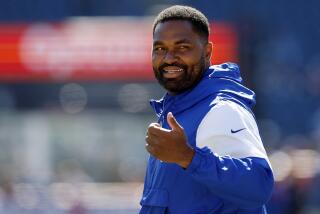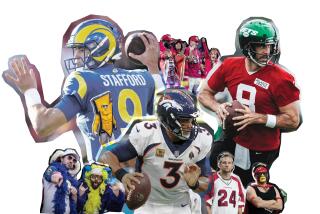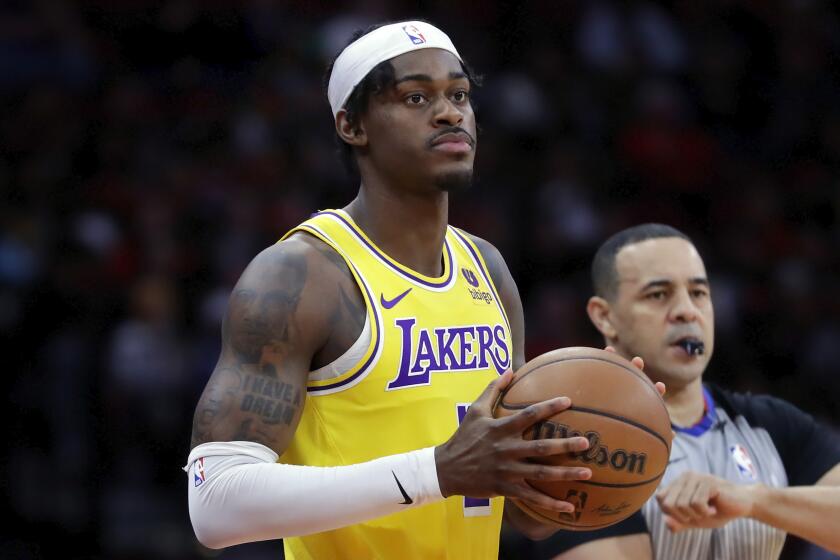SUPER BOWL XXIX : In This Race, NFL Can’t Make Up for a Bad Start
- Share via
The next great young NFL coach has four Super Bowl rings and dreams that glitter like diamonds.
“If I become a head coach, we will win the Super Bowl,” he says.
The next great young NFL coach has been a team leader, team spokesman, team conscience.
“Many of the things it takes to be a head coach in this league, I have done, I have lived,” he says.
Yet when Ronnie Lott ends his Hall of Fame career next season, the focus will not be on what he is, but what he is not.
He is not white.
And odds are good that the next great young NFL coach, an African American, will never coach a day.
In a league where 74% of the opening-day starters this season were black, Lott is nonetheless of the wrong race for a supervisory position.
“You look around today and see all these black players--goodness, some entire defenses are black,” Hall of Fame linebacker Bobby Bell said. “Then you look at the coaches, and almost all of them are white.
“And you say, ‘What?’ ”
What, indeed. The biggest problem facing the NFL as it streaks toward the turn of the century does not involve new fads or technologies, but the age-old millstone of racial inequality.
More than ever, the league is dominated by African American athletes. But more than ever, they are coached and controlled by whites.
Consider:
--On any given Sunday, African Americans represent about 65% of the league’s active total players.
Yet only 7% of the league’s head coaches--two--are African American, the Raiders’ Art Shell and Minnesota’s Dennis Green.
--Of the 308 opening-day defensive starters this season, 83% were African American.
Yet only 7% of the league’s defensive coordinators--two--were African American.
--Each of the NFL’s top 20 rushers and receivers this season was African American.
Yet only 14% of the league’s offensive coordinators--four--were African American.
--The top free agents each year since the new system began in 1993 have been African Americans such as Reggie White and Deion Sanders.
Yet there are only three African Americans among 28 player personnel directors.
How bad has the imbalance been? These numbers are actually league highs.
At the end of this year, there were 82 African American assistant coaches, an average of three on each staff of 10-12. Fifteen years ago, there were 14.
There have never before been so many black coordinators. And during the last off-season, a record 17 African Americans were hired for middle- to senior-management positions throughout the league.
Under Commissioner Paul Tagliabue, who has pushed such things as a minority coaching fellowship program, the NFL has made great strides toward diversity.
But that is why NFL officials are so worried. That is why they are running around whispering and fretting and hoping that somebody finally gives such longtime coordinators as Tony Dungy of the Minnesota Vikings and Ray Rhodes of the San Francisco 49ers chances.
Because the league knows it can do only so much. And that will never be enough.
“It is the men who run the show who must change--the owners,” said Mercury Morris, former Miami Dolphin running back. “The problem is a reluctance from them to give up their identity.”
That identity, is generally aging and rich. And in all cases, white.
And until their vision of a head coach or general manager resembles somebody who looks as much like Jim Brown as Paul Brown, the landscape will not change.
Few players will talk about it for fear of their jobs. But there are hints of an uprising by a group that has too long suffered from a form of taxation without representation.
Ironically, one troubling incident last season involved the Raiders’ Shell. When Shell reportedly directed a racial comment at Raider quarterback Jeff Hostetler, many in the league said he was talking the way white coaches and administrators have talked to African Americans for years.
“There are some guys in this league who have been noticing the imbalance and are concerned about it,” said Jackie Slater, the Rams’ veteran tackle. “It’s like, it took them 75 years to come up with two African American head coaches . . . and now it’s going to take them 75 years to come up with two more?”
Owners say there are no applicants.
“There aren’t great numbers there,” said Bob Harlan, CEO of the Green Bay Packers, a team that recently had African American offensive and defensive coordinators. “We will take the best man for the job, we won’t hesitate over color. But our experience has been that of our job applications, minorities have been few.”
Critics say that’s because African Americans are not put in positions to become head coaching candidates.
The best coaches are traditionally mediocre players who spent their careers mostly watching and learning. Bill Cowher of the Pittsburgh Steelers and Don Shula of the Miami Dolphins are two examples.
Some say African Americans are never given a chance to sit the bench. Either they start or are cut. Some ask, when is the last time you have seen a non-white walking the sidelines with a baseball cap and a clipboard?
“Coaches give white guys more chances to hang around--a lot of your marginal players are white,” said Jack Tatum, former Raider defensive back. “That’s how coaches are made, from marginal players who have to know everything.”
Tatum and other former players say white coaches simply don’t feel African Americans are smart enough to sit the bench.
“It’s like the blacks don’t know anything about the X’s and O’s,” said Larry Little, former Hall of Fame guard with the Dolphins.
Little, now the head coach at North Carolina Central University, used to long for an opportunity to return to the Dolphins as an offensive line coach, another good training ground for head coaches.
But Little is through hoping.
“You get slapped in the face so many times, you just stop trying,” he said of NFL management in general.
As former players have seen the makeup of the league change, they have wondered if current players would begin speaking out about the inequality.
That, former players say, is the only way the system can be changed. But they, too, are through hoping.
“Players today make too much money to say anything about it,” Little said. “They make a million a year, do they care about the other issues? Hell no.”
In Super Bowl XXIX this weekend between the 49ers and San Diego Chargers, 30 of the 44 starters will be African American--unlike either head coach and all but one of the coordinators.
Yet the players were indeed reluctant to talk about it.
“I’ve got a lot of other things I’m thinking about right now,” said Tim McDonald, 49er safety. “Sure, you would like to see more African Americans in those positions, but I think the league is making a solid effort in that area.”
Dana Stubblefield, 49er defensive tackle, said, “Sure, I notice (the inequality). But I’ve got no control over it.”
That attitude infuriates older former players, some of whom remember the year the old American Football League had to move its all-star game out of New Orleans because the all-stars refused to play in a town where blacks were not allowed to eat with whites.
“What you have today is what Malcolm X referred to as the difference between the field slave and the house slave,” Morris said. “The field slave wanted to revolt and the house slave said, ‘But why? Everything’s fine where I live.’ ”
Even 49er defensive coordinator Rhodes, behaving like the Vikings’ Green, talked around the topic.
“That’s a loaded question,” he said. “I know a lot of people who are really capable of doing the job. . . . I mean, this game is not hard. Football is not that tough.
“We just don’t seem to be getting the opportunities.”
The reason Rhodes would not blast owners probably has something to do with the recent interest shown in him by the Rams for their coaching vacancy. It also has to do with what high ranking African Americans in this league learned long ago.
“You have to play ‘the man’s’ game,” one said. “And no owner wants a black coach who mouths off about his race. So you have to work quietly within the system, succeed on the field, make progress with your results. Like Denny.”
Of course, the fact that a player such as Ronnie Lott can assume he would deserve an opportunity at a head coaching job even though he has paid no coaching dues leads to the potential for inequality of another kind.
“Do you know how many coaches in this league have been assistants for 20 years in hopes of becoming a head coach?” former New York Giant quarterback Phil Simms said. “I bet there are three guys out there on every team just dying for a chance. When you talk about guys going right from playing to coaching, what about all those guys who never had that chance?”
Twenty years for some, 75 years for others.
As the league culminates its 75th anniversary celebration this weekend, Mercury Morris said there is another date it should recognize.
“1969,” he said. “C’mon, we have to remember, it is no longer 1969.”
More to Read
Go beyond the scoreboard
Get the latest on L.A.'s teams in the daily Sports Report newsletter.
You may occasionally receive promotional content from the Los Angeles Times.











